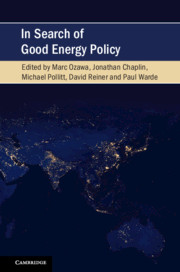20 results
IS A “NOAHIC GOVERNMENT” UP TO THE TASK? - Politics after Christendom: Political Theology in a Fractured World. By David VanDrunen. Grand Rapids: Zondervan Academic, 2020. Pp. 400. $29.99 (paper); $19.99 (digital). ISBN: 9780310108849.
-
- Journal:
- Journal of Law and Religion / Volume 36 / Issue 2 / August 2021
- Published online by Cambridge University Press:
- 29 July 2021, pp. 405-414
- Print publication:
- August 2021
-
- Article
- Export citation
THE ROLE OF THE STATE IN REGULATING THE MARITAL FAMILY - Church, State, and Family: Reconciling Traditional Teachings and Modern Liberties. By John Witte Jr. Cambridge: Cambridge University Press, 2019. Pp. 454. $130.00 (cloth). ISBN: 9781316882542.
-
- Journal:
- Journal of Law and Religion / Volume 34 / Issue 3 / December 2019
- Published online by Cambridge University Press:
- 24 February 2020, pp. 509-519
- Print publication:
- December 2019
-
- Article
- Export citation
Copyright page
-
- Book:
- In Search of Good Energy Policy
- Published online:
- 10 June 2019
- Print publication:
- 20 June 2019, pp iv-iv
-
- Chapter
- Export citation
Part III - Multidisciplinary Cases
-
- Book:
- In Search of Good Energy Policy
- Published online:
- 10 June 2019
- Print publication:
- 20 June 2019, pp 273-350
-
- Chapter
- Export citation
Acknowledgments
-
- Book:
- In Search of Good Energy Policy
- Published online:
- 10 June 2019
- Print publication:
- 20 June 2019, pp xxix-xxx
-
- Chapter
- Export citation
Tables
-
- Book:
- In Search of Good Energy Policy
- Published online:
- 10 June 2019
- Print publication:
- 20 June 2019, pp xv-xv
-
- Chapter
- Export citation
18 - From Inspiration to Implementation: Laudato Si’, Public Theology and the Demands of Energy Policy
- from Part II - Cases and Multidisciplinary Responses
-
-
- Book:
- In Search of Good Energy Policy
- Published online:
- 10 June 2019
- Print publication:
- 20 June 2019, pp 257-272
-
- Chapter
- Export citation
Contents
-
- Book:
- In Search of Good Energy Policy
- Published online:
- 10 June 2019
- Print publication:
- 20 June 2019, pp v-xii
-
- Chapter
- Export citation
Figures
-
- Book:
- In Search of Good Energy Policy
- Published online:
- 10 June 2019
- Print publication:
- 20 June 2019, pp xiii-xiv
-
- Chapter
- Export citation
Part I - Multidisciplinary Perspectives
-
- Book:
- In Search of Good Energy Policy
- Published online:
- 10 June 2019
- Print publication:
- 20 June 2019, pp 23-98
-
- Chapter
- Export citation
Contributors
-
- Book:
- In Search of Good Energy Policy
- Published online:
- 10 June 2019
- Print publication:
- 20 June 2019, pp xvi-xxviii
-
- Chapter
- Export citation
Index
-
- Book:
- In Search of Good Energy Policy
- Published online:
- 10 June 2019
- Print publication:
- 20 June 2019, pp 351-358
-
- Chapter
- Export citation
1 - Introduction
-
-
- Book:
- In Search of Good Energy Policy
- Published online:
- 10 June 2019
- Print publication:
- 20 June 2019, pp 1-22
-
- Chapter
-
- You have access
- HTML
- Export citation
22 - Responses and Final Thoughts
- from Part III - Multidisciplinary Cases
-
- Book:
- In Search of Good Energy Policy
- Published online:
- 10 June 2019
- Print publication:
- 20 June 2019, pp 336-350
-
- Chapter
- Export citation
Part II - Cases and Multidisciplinary Responses
-
- Book:
- In Search of Good Energy Policy
- Published online:
- 10 June 2019
- Print publication:
- 20 June 2019, pp 99-272
-
- Chapter
- Export citation
5 - Public Theology – ‘Grounded’: An Energy Policy Rooted in Human Flourishing
- from Part I - Multidisciplinary Perspectives
-
-
- Book:
- In Search of Good Energy Policy
- Published online:
- 10 June 2019
- Print publication:
- 20 June 2019, pp 57-68
-
- Chapter
- Export citation

In Search of Good Energy Policy
-
- Published online:
- 10 June 2019
- Print publication:
- 20 June 2019
Oliver O'Donovan's The Ways of Judgment
-
- Journal:
- Scottish Journal of Theology / Volume 61 / Issue 4 / November 2008
- Published online by Cambridge University Press:
- 01 November 2008, pp. 477-493
- Print publication:
- November 2008
-
- Article
- Export citation
Capacity to consent to treatment in patients with acute mania
-
- Journal:
- Psychiatric Bulletin / Volume 30 / Issue 11 / November 2006
- Published online by Cambridge University Press:
- 02 January 2018, pp. 419-422
- Print publication:
- November 2006
-
- Article
-
- You have access
- Open access
- HTML
- Export citation
Religious Human Rights in Global Perspective. Vol. 1: Religious Perspectives. Edited by John WitteJr. and Johan D. van der Vyver. The Hague: Martinus Nijhoff1996. Pp. xxxv, 597. $198.00. ISBN: 9-041-10176-4. Paper. $29.00. ISBN: 9-041-10179-9. - Religious Human Rights in Global Perspective. Vol. 1: Legal Perspectives. Edited by Johan D. van der Vyver and John Witte Jr. The Hague: Martinus Nijhoff1996. Pp. xlvii, 670. $198.00. ISBN: 9-041-10177-2. Paper. $29.00. ISBN: 9-041-10180-2. Set of two volumes: Hardcover. $327.50. ISBN: 9-041-10178-0.
-
- Journal:
- Journal of Law and Religion / Volume 16 / Issue 2 / 2001
- Published online by Cambridge University Press:
- 24 April 2015, pp. 617-621
- Print publication:
- 2001
-
- Article
- Export citation



